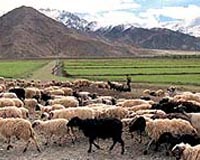 |
Canberra, Australia (SPX) Aug 19, 2009 CSIRO and the Department of Agriculture and Food Western Australia (DAFWA) are collaborating to try to outwit one of southern Australia's worst agricultural weeds. "We are initiating a one-year study to see if it would be feasible to control one and two-leaf Cape tulips (Moraea flaccida and M. miniata) using the rust fungus Puccinia moraeae as a biological control agent," CSIRO Entomology's Dr John Scott said. "Dr Louise Morin, our experienced plant pathologist, will be testing various rust isolates to see how pathogenic they are on Cape tulips occurring in Australia as well as testing them on a few key closely-related, non-target plant species. "The tests will be conducted in the AQIS-accredited CSIRO Black Mountain Containment Facility in Canberra." Dr Scott said Cape tulips appear to be suitable targets for biological control because there are only a few close relatives among Australian native species and no related crops. The logical place to look for possible biological control agents for Cape tulips was their home range, South Africa. Earlier CSIRO surveys there identified three potential biological control agents, of which the rust appears the most promising. This initial study, funded by DAFWA, will yield information on the aggressiveness of the rust on Cape tulips and assist in determining its biological control potential. "It will also provide preliminary information on the susceptibility of key non-target plant species to the rust. This is an important first step in deciding if the rust should undergo future comprehensive host-specificity testing," Dr Scott said. Cape tulips were introduced to Australia from South Africa in the mid-19th Century as garden plants. Since then, they have become major pasture weeds in Western Australia, South Australia, Victoria and New South Wales. They are unpalatable and poisonous to livestock. Cape tulips are also invading natural ecosystems and have the potential to be serious environmental weeds. Share This Article With Planet Earth
Related Links CSIRO Entomology Farming Today - Suppliers and Technology
 Global warming good for farming, tourism in Tibet: Chinese official
Global warming good for farming, tourism in Tibet: Chinese officialBeijing (AFP) Aug 18, 2009 Global warming could prove devastating for the Tibetan plateau, the world's third-largest store of ice, but it helps farming and tourism, Chinese state media said Tuesday, citing a leading expert. Qin Dahe, the former head of the China Meteorological Administration, made the comment in an otherwise gloomy assessment of the impact that rising temperatures will have on Tibet, according to the ... read more |
|
| The content herein, unless otherwise known to be public domain, are Copyright 1995-2009 - SpaceDaily. AFP and UPI Wire Stories are copyright Agence France-Presse and United Press International. ESA Portal Reports are copyright European Space Agency. All NASA sourced material is public domain. Additional copyrights may apply in whole or part to other bona fide parties. Advertising does not imply endorsement,agreement or approval of any opinions, statements or information provided by SpaceDaily on any Web page published or hosted by SpaceDaily. Privacy Statement |